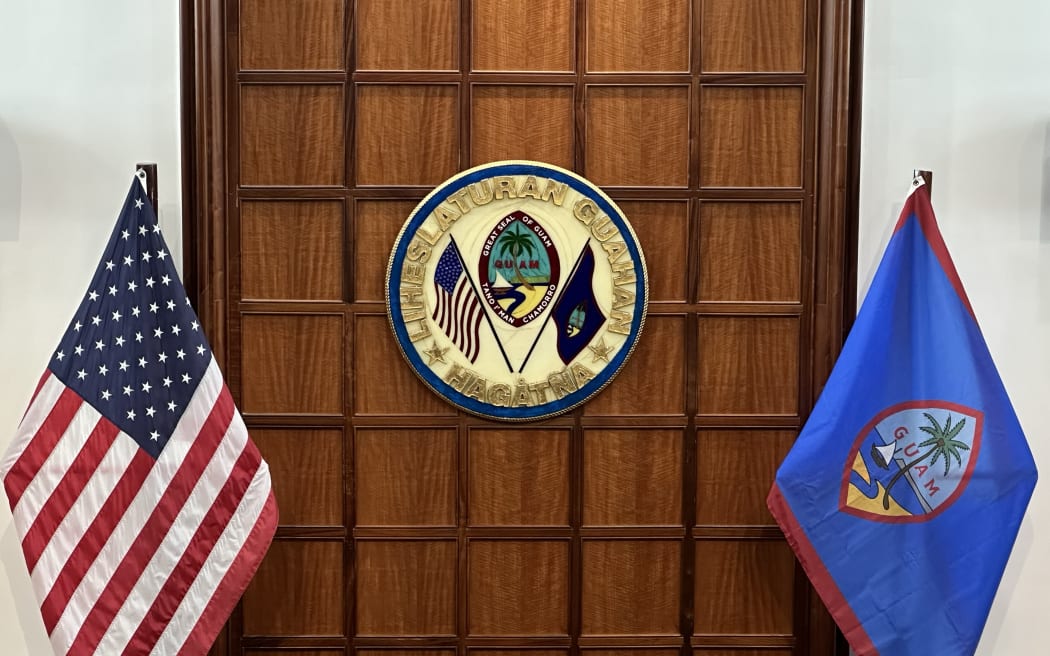
Guam Legislature generic Photo: RNZ Pacific / Eleisha Foon
Why America's muscling up of might in Guam will have a ripple effect in the Pacific, including on NZ's peace-making efforts
The tiny island of Guam is known as the tip of the US military spear.
It is closer to Beijing than to Hawaii, and is a hugely valuable strategic asset for that reason - especially now there are rising tensions around China's presence in the Pacific, and surrounding North Korean missile testing.
Right now there is a massive build-up going on there of the already significant American military presence as it gets ready for a decade of twice-yearly missile weapons testing.
By 2028, the US will spend $9 billion to relocate 5000 marines from Japan, build an integrated missile defence system, and add command functions for the army, navy and air force. It already occupies 25 percent of the country.
This muscling up of might will affect New Zealand's diplomatic and peacemaking efforts in the region, and have a ripple effect on the region's stability.
Guam has applied to become a full member of the Pacific Island Forum.
The island's people are Pacific Islanders - and US citizens.
On The Detail, we talk to RNZ Pacific's Eleisha Foon, who has just returned from Guam, about the issues Guamanians face and their mixed attitudes to America's presence.
"The military have put a case to Washington saying they're not prepared for potential attacks - missile attacks - and threats from China and North Korea. What we're seeing is Guam, which has historically been a magnet for warfare and conflict, at the centre of geo-politics in the Pacific," she says.
"The United States has described Guam as a 'set piece' in its war chest."
Foon compares Guam to the canary in the coalmine when it comes to the Pacific.
The military manoeuvres have left locals feeling powerless over what happens on their own land, and to their environment and their health, she says.
"There were about 250 letters sent out to land owners (around the Andersen base, which will be one of the main areas for missile testing) letting them know that potentially they would have to move; they'd be compensated but they'd have to leave their properties.
"There's a lot of land that is shared, there is limited access, and so it's not great for a lot of locals."
Some of those locals are still fighting a decades-old battle to get their land back after they were displaced generations ago when it was taken to build the base.
"Already they're suffering from a lot of poor health and conditions. Water is contaminated on the island. Not to mention the impact of military on wildlife as well. It's a difficult place to be."
"When I was there I really got this sense that something was building up; there was a lot of palpable tension ... it's a potential conflict zone."
She describes as "surreal" the mingling of uniformed soldiers with Japanese and Korean tourists at hotels just a couple of kilometres from these huge bases.
Foon's visit involved talking to the governor of Guam, locals, and cultural historians, and she was on the spot for discussions with the military.
She talks to Sharon Brettkelly about her trip to Andersen Air Force Base, which - although her interactions were carefully controlled by media minders - was obviously undergoing a great deal of construction.
Guam is known as a recruiter's paradise and former military who are (indigenous) Chamorros say they now feel suspicious, and there is not enough transparency over what is going on.
There is another issue - compensation for the downwind effects of 67 nuclear tests in the region between 1946 and 1958. Foon talks about that in the podcast.
But the local governor Lou Leon Guerrero told Foon it was important the military stayed, or the island was under threat of coming under Chinese rule. She said North Korea sent missiles "every other week" their way.
The fear of cyber attacks and nuclear attacks is real.
Other locals see the US military as liberators heroes after the Japanese occupation in World War II left trauma behind.
On the other side are those who want independence and see the US presence on the island "like having a giant living in your home", Foon says.
"It's a so-called friendly giant, but the home will get damaged."
Check out how to listen to and follow The Detail here.
You can also stay up-to-date by liking us on Facebook or following us on Twitter.







